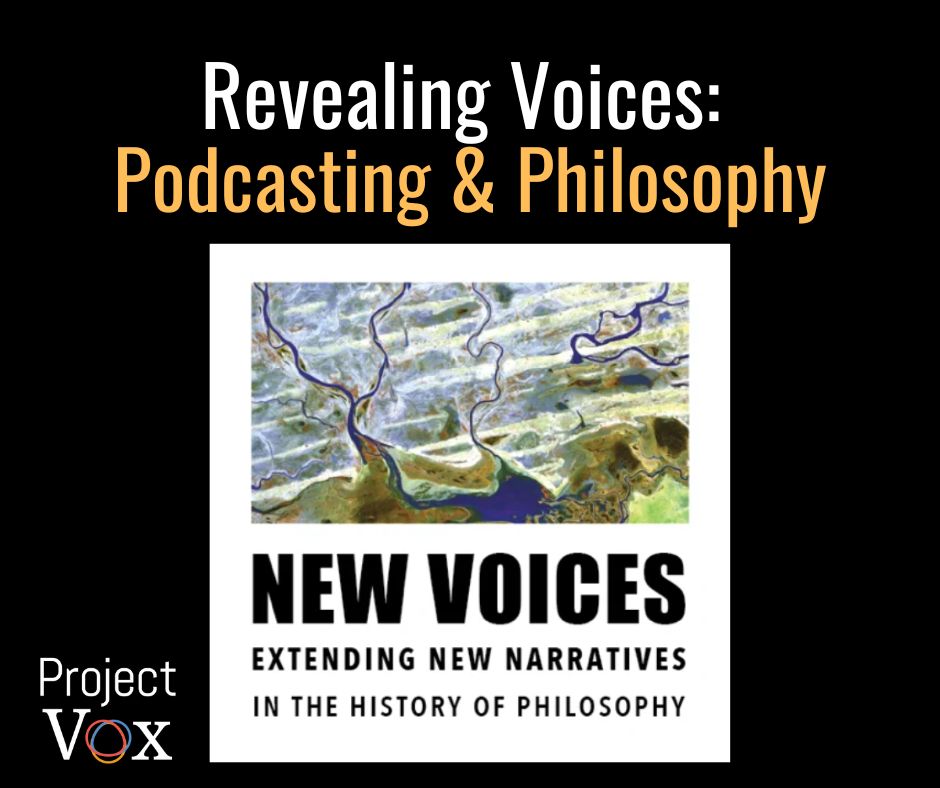This post is part of our Revealing Voices blog series.
We are Olivia Branscum and Haley Brennan, and together we run the New Narratives in the History of Philosophy podcast. This podcast project and Project Vox are part of the Extending New Narratives in the History of Philosophy project (funded by the Social Sciences and Humanities Research Council of Canada).
Our podcast is meant as an approachable resource for learning about figures and themes that are traditionally underrepresented or excluded from courses and work on the history of philosophy. Each episode is a conversation with a researcher working on these figures and themes. In running the podcast as a series of conversations, our main goal is to highlight the experience of studying underrepresented topics – how to get going on this kind of research, the challenges involved, and the excitement and value of this work. For instance, we’ve talked to Nastassja Pugliese about the Brazilian philosopher and educator Nísia Floresta, Chike Jeffers on the history of Africana philosophy, and Dalia Nassar on nineteenth-century German women philosophers. In addition to the details of the figures and topics covered, our conversations touch on issues that come up in the course of doing expanded-canon or canon-critical work: the role of language in philosophy, the importance of real-world examples in working through abstract issues, and what it means to bring your unique personality and perspective to philosophical work.
There is great value in simply finding that non-canonical philosophers are part of the historical record, but even further value in realizing that there are researchers currently engaging them in serious study. We can both personally speak to this value: for Haley, realizing this was part of what made her interested in studying philosophy in the first place, and for Olivia, this made the difference between deciding to leave the profession and stay in it. As we progressed through our respective degree programs, we wanted to contribute to the effort to make non-canonical philosophical work more accessible to people who might benefit from its availability as much as we did. Podcasting offers us an opportunity to do so: we both have prior experience working with the medium, and creating the New Narratives podcast allows us to take advantage of the immediacy and accessibility of audio media to realize this goal. You can listen to a podcast casually while taking a walk or doing the dishes, and hearing someone talk freely about their experiences has a much more intimate, approachable feel than encountering that person’s work in academic prose. These features of podcasting combine to make it a great way to communicate directly and unpretentiously, even when the material being discussed is quite complex. We hope that both the content and the form of the podcast work together to showcase the ways that philosophy can be done and thought about outside of the arcane topics that often occupy our philosophical attention.
Our podcast aims to contribute to the project of diversifying the history of philosophy in a couple of distinct ways. First, we recognize that current philosophy students, whether or not they want to pursue philosophy professionally, are curious about philosophers from history who challenge our assumptions about who can be a philosopher and what kinds of questions are philosophically interesting. One of the main audiences we have in mind when producing each episode is philosophy students who might want to start working on under-studied figures but aren’t encountering them in their courses. We want the podcast to demonstrate both that there are people working on these figures, and that there are ways to begin doing this work even if no one else has started yet.
Second, we suspect that many philosophy educators want to teach more diverse figures, but aren’t sure where to start. Like the sample syllabi available on the Project Vox website, each episode offers a starting point for teaching the philosopher(s) under discussion; we ask each person we interview to share about their experiences with researching and teaching the relevant figures. In this way, we hope to help spread the word about interesting philosophers from history to prospective educators and scholars alike. Finally, in addition to its unique advantages for communicating about non-canonical philosophical figures, podcasting shows the humanity of the scholars we’re talking to. Over the course of our conversations, we talk frankly and openly about how ideas come to you, what it means to follow through on a project, and how emotional this process can be: challenging and exciting all at the same time. Hearing these conversations can make the role of professional philosopher more accessible, and the processes of academic work more transparent. We see all of this coming together to support our ultimate goal, which is to make professional philosophy – and academia in general – a more inclusive space that promotes a variety of work in both form and content.
You can find out more about the podcast and listen to episodes on the Extending New Narratives website. Episodes are also available on Spotify, iTunes, or our podcast feed.
Haley Brennan is a PhD candidate in the philosophy department at Princeton University. Her research focuses on the metaphysics and ethics of identity and the significance of self-referring thoughts, especially in early modern and German idealist philosophy.
Olivia Branscum is a PhD candidate in philosophy Columbia University. Olivia’s dissertation project argues that Margaret Cavendish and Anne Conway can both be understood as panpsychists who redefine ‘body’ to accommodate the ubiquity of extended thinking stuff in creation.


